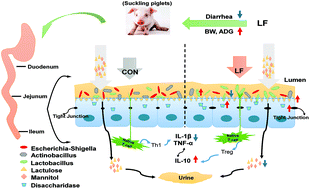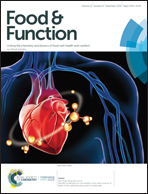Effects of early-life lactoferrin intervention on growth performance, small intestinal function and gut microbiota in suckling piglets†
Abstract
The early postnatal stage is a critical period for suckling animals in developing intestinal function and stabilizing gut microbiota. Lactoferrin (LF) plays a critical role in promoting gut development and regulating gut microbiota. This study investigates the impact of early-life lactoferrin (LF) intervention on the growth performance, small intestinal function and gut microbiota in suckling piglets. Sixty suckling piglets (1.51 ± 0.05 kg) obtained from six sows (10 piglets per litter) were assigned to a control (CON) group and an LF group in each litter, which were sow-fed. Piglets in the LF group were orally administered 8–12 mL LF solution (0.5 g per kg body weight per day) for a week, and piglets in the CON group were orally administered the same dose of physiological saline. Six piglets (n = 6) from each group were euthanized on days 8 and 21. The early-life LF intervention increased growth performance, with higher villi height of the jejunum and greater disaccharidase activity of the jejunum and ileum (P < 0.05). Diarrhoea incidence decreased in the LF group from day 1 to day 7 (P < 0.05). Urinary lactulose–mannitol ratios decreased in the LF group, whereas the gene and protein expressions of jejunal occludin increased in the LF group on day 8 and day 21, and higher gene and protein levels of ileal occludin were observed on day 8 (P < 0.05). Additionally, the LF piglets had lower concentrations of IL-1β and TNF-α, and higher concentration of IL-10 in the jejunum (P < 0.05). For the ileum, higher concentration of IL-10 and lower concentration of TNF-α were observed in the LF group (P < 0.05). LF piglets had a greater abundance of Lactobacillus and lower abundance of Veillonella and Escherichia-Shigella in the jejunum on day 8 (P < 0.05). In the ileum, the abundance of Actinobacillus was decreased in the LF piglets on day 8 and day 21 (P < 0.05). The early-life LF intervention enhanced the growth performance and decreased diarrhoea incidence in the suckling piglets by promoting the development of intestinal function and changing the microbiota in the small intestine.



 Please wait while we load your content...
Please wait while we load your content...